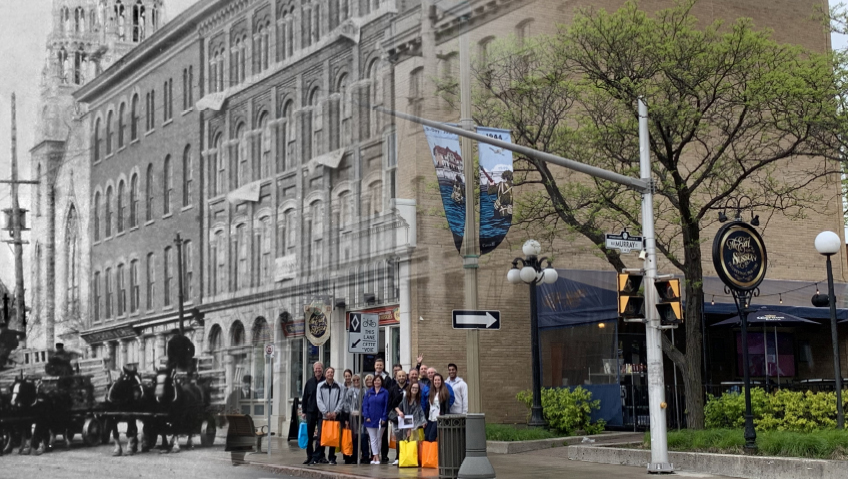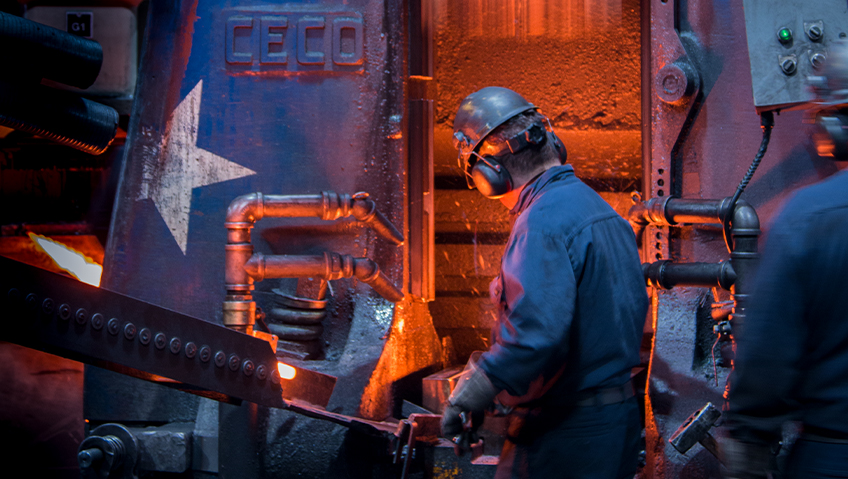The pandemic has taught us much: domestic manufacturing is critical; cleanliness is vital against infection; and we must care for each other and our environment. These are the things Dustbane, Canadian manufacturer of commercial cleaning products, has been doing since 1908.
We spoke with company owner and President Benjamin Merkley, who represents the third generation of company ownership; Senior Vice President Marc Galarneau, who’s been with the company for over 40 years; and Vice President of Sales, Shannon Hall, to learn more about Dustbane and how it is ticking all the boxes.
The company’s roots can be traced back to several years before it was founded by Chester Pickering in Ottawa in 1908 – to a time when he was a homeless teenager who did cleaning chores for housewives in exchange for food. But it wasn’t just a matter of earning a meal for himself, says Hall; he’d offer to do extra so that he’d get more food to share with friends who were also homeless.
To this day, Dustbane’s guiding principles have remained focused on ensuring a clean environment for the public, whether it be in a school or hospital, on a construction site or airplane, or in a shopping mall. And, through its corporate culture, Dustbane remains committed to helping others, just as Chester Pickering did.
“We grew from manufacturing a single product,” says Merkley, “to where we are today, supplying a full line of cleaning chemicals and equipment for commercial and industrial use. What makes us different is how we go to market. We really try to engage with the end users to understand their businesses and challenges and we come up with customized solutions that we can provide through our local distribution partners.”
Dustbane still manufactures the original sweeping compound that gave its name to the company, but in truth, Dustbane is about so much more.
In a 155,000 square foot facility in Ottawa, the company manufactures over 100 commercial and industrial cleaning chemicals including a complete range of ECOLOGO® Certified products. All have undergone testing to ensure they are compliant with national environmental standards and meet industry-specific needs.
In addition, the company manufactures floor polishers, vacuums, and other cleaning equipment and accessories. The company keeps significant inventory and is ready to ship from the warehouse to distributors across Canada on the same day an order is received.
Game changers
While phrases such as ‘game changer’ are sometimes merely advertising hype, Dustbane’s HealthGuard One-Step Disinfectant, Cleaner and Deodorant concentrate, when used with the Victory Electrostatic Sprayer, is a veritable game changer.
As the COVID-19 pandemic swept the country, the Victory Electrostatic Sprayer put Dustbane light-years ahead of the competition, focusing on the critical need for thorough disinfection of shared hard surfaces in public places. “The notion of, ‘If it looks clean, it must be clean,’ was no longer good enough,” says Galarneau, who after over 40 years at Dustbane knows a thing or two about cleaning.
This disinfectant concentrate manufactured by Dustbane is an effective mildewcidal and fungicidal sanitizing spray that will completely disinfect visibly clean, hard, non-porous surfaces within five minutes of contact time, the company says. But application through a hand-held spray bottle is time-consuming, especially if there’s a requirement to penetrate every crack and cranny of surfaces people may have touched, or where mildew or fungus is growing. And also, in high traffic areas, having to do it more than once a day.
This is where a partnership with the U.S.-based Victory Innovations Company, which manufactures the Victory Electrostatic Sprayer, enters the equation.
As the company explains it, the sprayer’s “patent-pending technology provides an electrical charge to the disinfectant, allowing it to wrap conductive surfaces with an effective and even coverage. Double-charged particles also envelope all surfaces, whether they’re shadowed, vertical or underneath.”
The sprayer was designed to save time and labour, to spray less liquid and cover more surface area, and since 2019 has been distributed in Canada by Dustbane.
We watched a demonstration video and saw how a traditional spray bottle took 1 minute and 13 seconds to cover a 50 square foot area, gulping over 10 fluid ounces of disinfectant. But it was truly eclipsed by the capabilities of the Victory Electrostatic Sprayer which covered the same area (at its maximum application-thickness setting of 110 microns) in just 22 seconds, sipping just over three fluid ounces.
The result was a 69 percent reduction in the amount of chemicals used, and completion more than three times faster by the Victoria Electrostatic Sprayer.
Merkley shares how “we’d started looking for innovation and bringing a solution to the marketplace to make the job easier, to hit the performance curve and get a return on investment, and this was it. The device sprays electrically charged particles into the air and these are attracted to hard surfaces. They spread and land evenly, and if using a disinfectant, kill viruses and bacteria.”
The demands of staying safe
This was prior to COVID-19 when the sprayer was being shown as a way to reduce labour and product costs, but when the pandemic hit, Merkley says, there was a huge demand for cleaning solutions. The demand was so great that the Dustbane team immediately pivoted to doing thousands of virtual demos with distributors as well as end users – factories, schools, hospitals, municipalities – how to use the product, giving them a safe solution to issues posed by the pandemic, and in the process, revolutionized cleaning.
“I want to tell you,” says Merkley, “how proud I am of the way our staff responded during the pandemic, when it got crazy in March, 2020. The demand for cleaning solutions was overwhelming and our staff responded beyond what I could have hoped for.” Dustbane operates on a five-day, 40-hour production schedule, “but we were beyond double shifting seven days a week to keep up with demand. Staff from accounting and financing, and Marc and Shannon and I, we were all pitching in on the filling line to get the product out to our customers.”
Galarneau believes the demand for this product will continue. “We believe that long after the pandemic is past, cleaning is going to remain a priority in everyone’s life. People are going to expect to work in a clean office and enjoy clean environments wherever they go.”
Site surveys show the way
When Merkley and his team went into the field to demonstrate the electrostatic sprayer, it was by no means the first time they had connected in such a personal way with end users. In fact, the company’s entire sales program is centred around providing cost-effective solutions to cleaning challenges, as opposed to simply selling product.
It begins with a site survey, which involves taking an audit of a business or institution’s cleaning practices and is offered without charge. From there a Dustbane representative can show the end user just how much is being spent, can identify labour savings, and point out blind spots that may affect health and safety.
Hall says that end users face challenges around how they do their cleaning, and to assist with that the Dustbane team can create individualized programs, with flow charts and matching materials and training sessions that demonstrate how to apply the chemicals in the safest way. This way tasks are not missed, and nothing is done that could badly impact surfaces.
“There are different risks and hazards in every area,” she says. “Healthcare has its own challenges, but so does manufacturing, where there could be opportunities for bacteria to build up in sitting water or grease spills. We need to look at what risk or hazard is associated with each specific business. We don’t take a cookie-cutter approach as no two situations are ever the same.”
Giving meaning to cleaning
This article began with the tale of how Dustbane founder Chester Pickering shared food he earned by doing household chores among other homeless youth. 113 years later, the company remains true to his humanitarian outlook, through a formalized program Give Meaning to Your Cleaning™, aimed at giving back to local communities and doing what is right for the planet.
A year ago, Dustbane began planting a tree for every jug of its hard-surface cleaner sold. To date over 185,000 trees have been planted in Madagascar, an island country off the east coast of Africa that has been ravaged by the effects of deforestation, land degradation, and the effects of climate change. 80 percent of the population is subsistence farmers who survive on $2 per day.
By planting trees, the people are paid a living wage and food security is enhanced. It is also hoped that this may help reverse some of the effects of land degradation which has almost destroyed the island nation and that the trees will have a positive effect on climate change.
With regards to Dustbane’s manufacturing policy vis à vis the environment, raw materials and packaging materials are carefully selected, with products undergoing a stringent third-party certification process.
The company is also working to remove single-use plastics while researching creative ways to repurpose other materials. For example, the sweeping compound is shipped in reusable garbage containers manufactured from recycled plastics collected in blue bins in Ontario.
Acts of Kindness is another branch of Dustbane’s Give Meaning To Your Cleaning™ program. It partners with not-for-profits in various locations across Canada where the company does business. In Ottawa it has partnered with Equal Chance, a charity whose focus is on helping economically disadvantaged black youth and providing them with some of the educational equipment children from middle class families take for granted.
Elsewhere in Canada the company partners with distributors to help a local charity or cause. In East Vancouver, for example, they loaded a truck with 400 pizzas and drinks, and served them to 400 people in need. They also donate cleaning chemicals to homeless shelters and other not-for-profits which may find maintaining a clean environment a challenge.
“There are lots of different ways to support organizations across the country and around the world. It’s been a phenomenal journey,” says Hall.
Chester Pickering would be proud.






